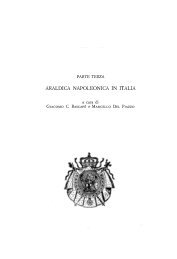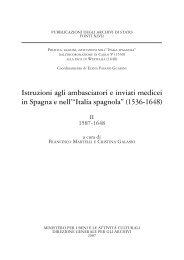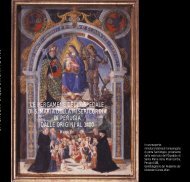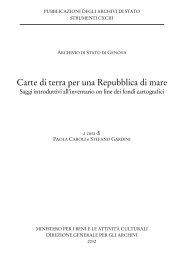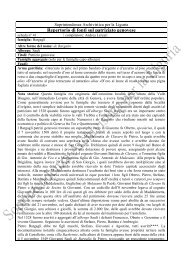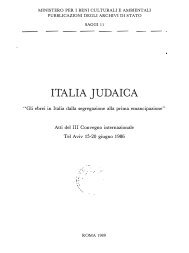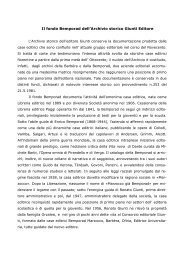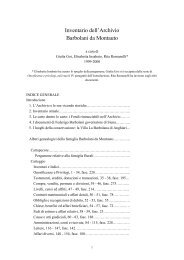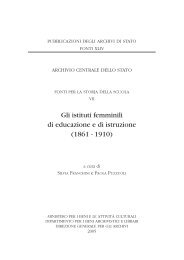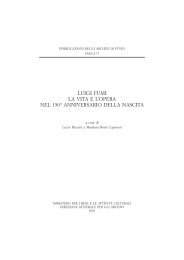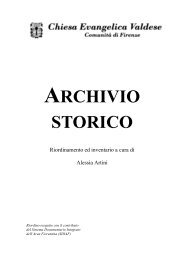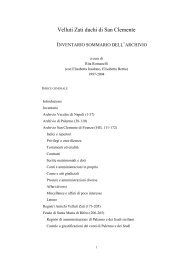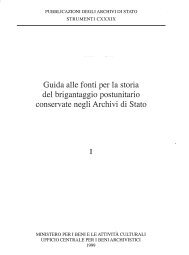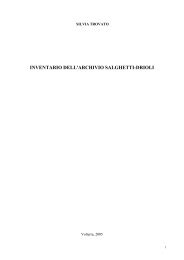ITALIA JUDAICA - Direzione generale per gli archivi
ITALIA JUDAICA - Direzione generale per gli archivi
ITALIA JUDAICA - Direzione generale per gli archivi
You also want an ePaper? Increase the reach of your titles
YUMPU automatically turns print PDFs into web optimized ePapers that Google loves.
142 Abraham Melamed<br />
deny the great influence of Renaissance historiography upon de' Rossi's historical<br />
views 13. Thus, Yerushalmi had to admit that de' Rossi's book « presents<br />
special problems » 14• He solved these problems by presenting de' Rossi as<br />
an exception 15•<br />
In Baron's view, de' Rossi, the leading Jewish historian of the <strong>per</strong>iod,<br />
_<br />
remamed essentialiy « medieval », just like his lesser contemporaries. Por<br />
Yerushalmi, de' Rossi was exceptionally « modern » in comparison with his.<br />
basicaliy « medieval » contemporaries. I shali argue, however, that de' Rossi,<br />
although the most daring Jewish historian of the <strong>per</strong>iod, stili was only one<br />
representive of a new trend in Jewish historical thought, who attempted to<br />
revaluate the meaning of Jewish history as a result of the effects of the Iberian<br />
catastrophe and the influences of Renaissance historiography 16•<br />
I t seems that Y erushalmi carne t o his conclusion, erroneous in my view ,.<br />
since he consulted only sources which are historiographical in the limited sense<br />
of the term, and disregarded other contemporary literary Italian Jewish genres.<br />
containing historical observations. He also limited himself to the sixteenth<br />
century, while the contemporary revaluation of the meaning of Jewish history<br />
continued well into the seventeenth century. In addition, Y erushalmi barely<br />
related to the conflicting currents in the development of Italian historiography<br />
of the sixteenth century, which possibly influenced contemporary Jewish historiography,<br />
and as such may shed new light on its development. Yerushalmi's<br />
insistence that the flourishing of J ewish historical thought of the <strong>per</strong>iod was<br />
related only to developments internai to Jewry, can not explain the fact<br />
that this phenomenon centred mainly in Italy. Only when we take into con<br />
sideration the influence of Renaissance historiography can this fact be pro<strong>per</strong>ly<br />
explained.<br />
Thus, my study will attempt to re-examine the whole issue. It rests upon<br />
the methodological assumption that, generally speaking, historical and inteliectual<br />
developments within Jewry can not be su:ff:ìciently explained without relating<br />
them to external influences. This is even more the case when dealing with the·<br />
Renaissance and post-Renaissance Jewish community in Italy, which was more<br />
open to influences of the external culture then any other Jewish community·<br />
before the Enlightenment. Since, in generai, Renaissance culture profoundly<br />
13 Y. H. YERUSHALMI, Clio and the Jews . .. cit., also p. 632.<br />
14 Ibidem.<br />
15 Ibid., p. 620; also p. 632: « Azariah's ex<strong>per</strong>iment, however, remained his alone,.<br />
there were no heirs to his method ».<br />
16 It is interesting to note that Shulvass, who emphasized the influence of Renais<br />
sance historiography upon Jewish historians, used the example of de' Rossi while Roth<br />
arguing that there was no substantial influence of Renaissance historiograhy does no:<br />
mention de' Rossi at all in this context; above, nn. l e 2.<br />
The Perception of Jewish History in Italian Jewish Tbought<br />
influenced contemporary Jewish thought and culture, its influence should be<br />
noticeable in particular in Jewish scholars' <strong>per</strong>ception of the meaning and<br />
direction of Jewish history.<br />
The focus of this study is not Jewish historiography in the limited sense<br />
of the term, that is, the attempt to record the events of the human past<br />
which are deemed worthy of remembrance, but mainly historiosophy, that is, the<br />
idea of history, and in our case, the attempt to understand the meaning and<br />
direction of Jewish history. The two should nor be confused, although there<br />
is an intrinsic connection between them 17• This study also considers the<br />
then new historical and literary sources and methodological tools utilized by<br />
contemporary Jewish scholars, in their endeavour to understand the meaning of<br />
Jewish history.<br />
Thus, the sources consulted for this study were not limited to Jewish<br />
histories written during this <strong>per</strong>iod, like those of Joseph ha'Kohen, Azariah de'<br />
Rossi, Gedaliah ibn Y ahiah of Elijah Capsali, but also to other branches of J ewish<br />
literature of the <strong>per</strong>iod, like the writings of Don Isaac Abravanel, Abraham<br />
Portaleone, Leone da Modena and Simone Luzzatto. Ali of these sources were<br />
considered relevant in attempting to detect the influences of Renaissance historiography<br />
upon the Jewish conception of Jewish history.<br />
Now, it would be hazardous to maintain that every Jewish thinker and<br />
historian of the <strong>per</strong>iod was automatically influenced by the new trends in the<br />
historical W eltanschauung, and thus to obsessively detecting the latter influence<br />
on every text. Baer's and Shulvass' overestimation of the influence of Renaissance<br />
historiography upon J ewish historians are cases in point.<br />
However, the fact that there was an ever growing influence of the new<br />
Renaissance <strong>per</strong>ception of human history upon Jewish thinkers' assessment of<br />
their own history can not be denied. They somehow tried, often in vain, to<br />
create a composite picture from the medieval tradition which they inherited<br />
and the new Renaissance conception of human history. This was the case with<br />
ali the cultura! fìelds which occupied Italian Jewish thinkers of the <strong>per</strong>iod.<br />
The aim of this study is to show how the methodology, sources and<br />
historiosophic conceptions of Renaissance historiography influenced J ewish thinkers<br />
and contributed to a new approach towards the study of Jewish history.<br />
This will be attempted by exploring the possible influence of three major<br />
aspects of Renaissance and Counter-Reformation Italian historiography upon<br />
the Jewish scholars' conception of Jewish history in its development, from<br />
the early sixteenth century to the mid-seventeenth century.<br />
2. One of the main attributes of Renaissance historiography was the<br />
attempt to give natural and rational explanations to historical occurrences in<br />
17 Y. H. YERUSHALMI, Clio and the fews ... cit., pp. 610-613.<br />
143



